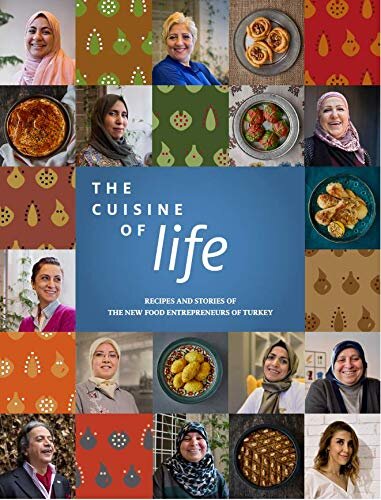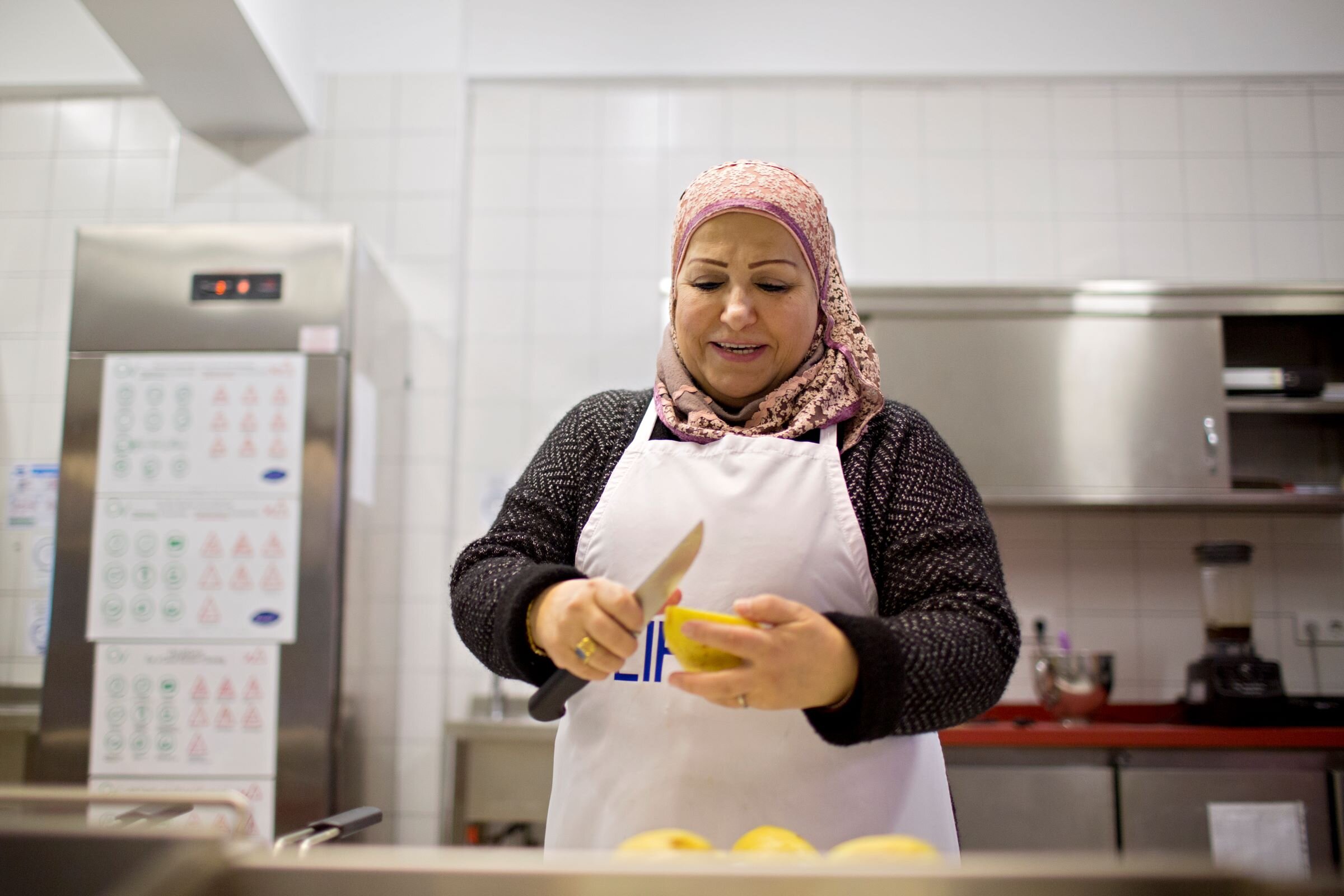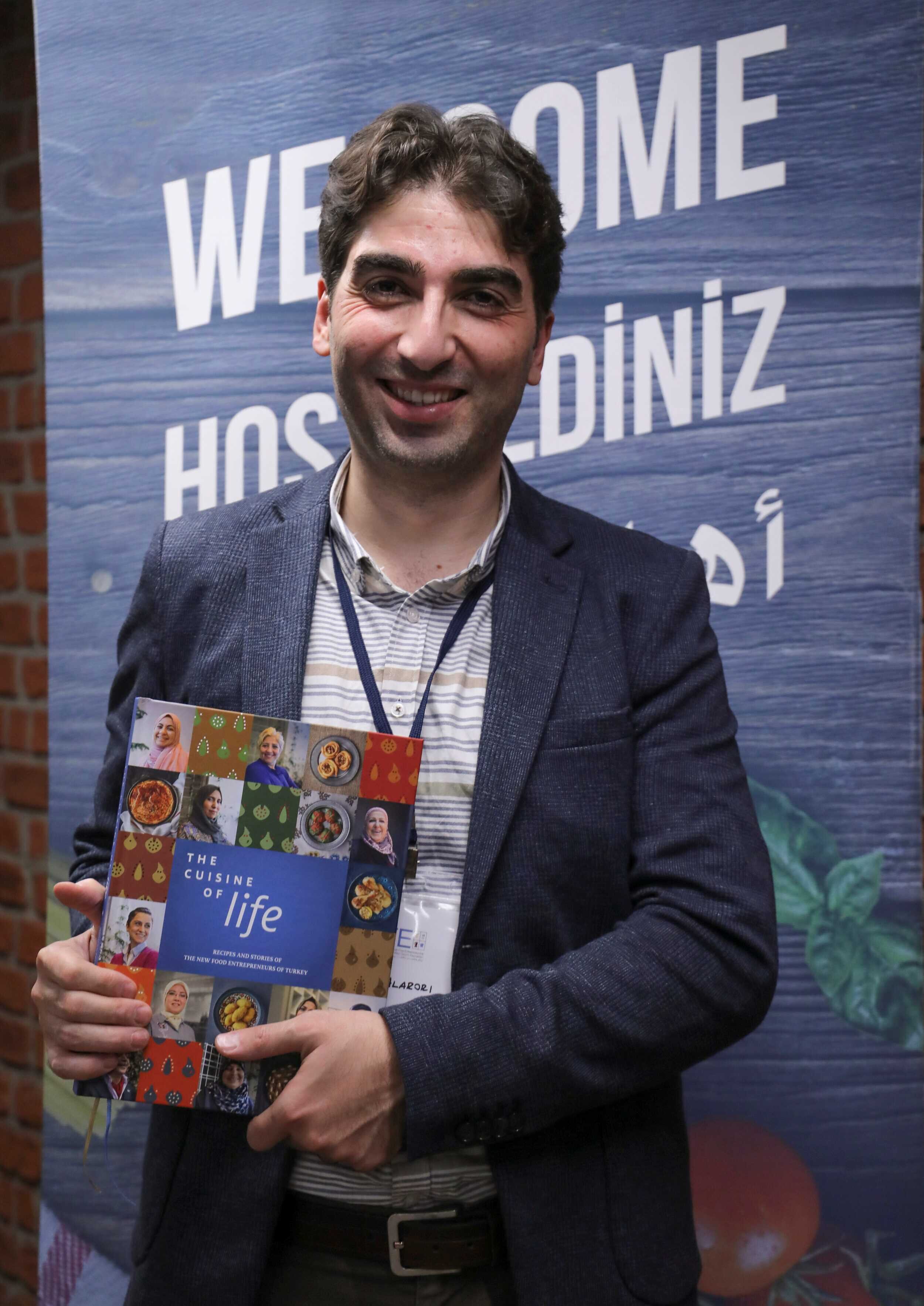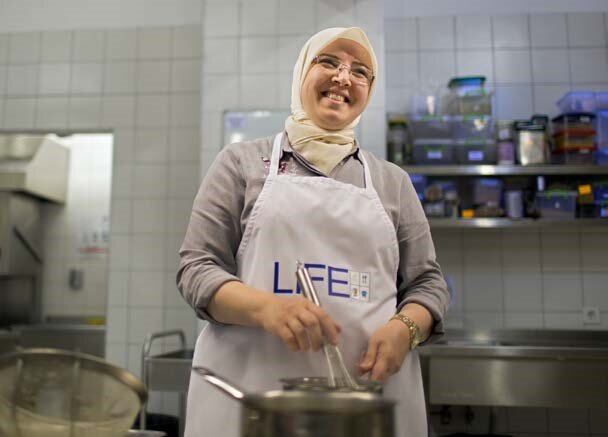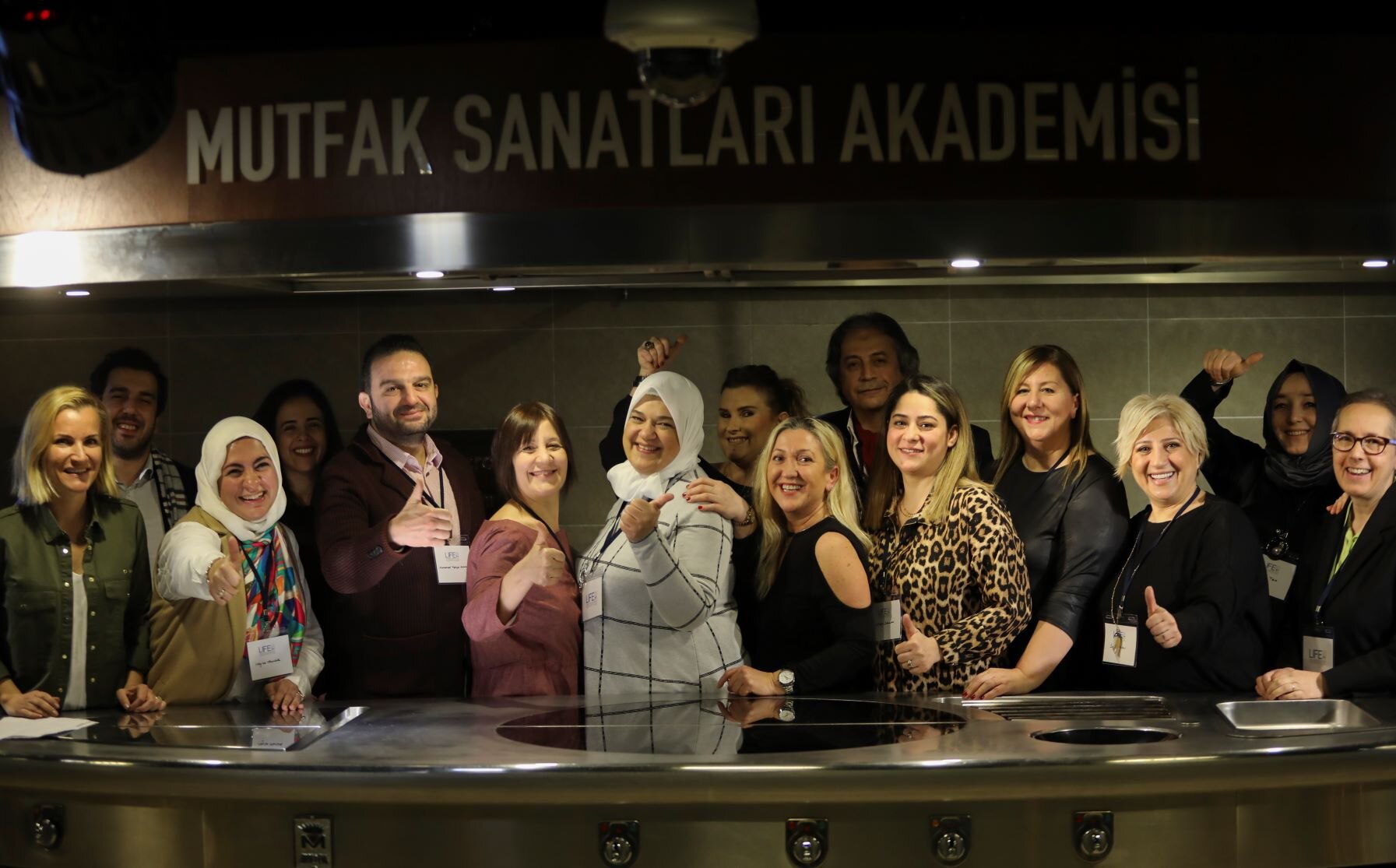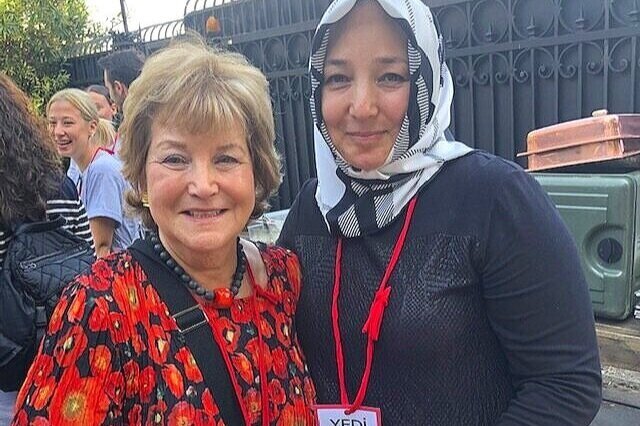Advertisement
Behind The Cookbook: The Cuisine of Life
28 October 2020 · Behind the Cookbook · Regional cooking
From Family Traditions to Home Kitchens: The Journey of The Cuisine of LIFE
By Alaa Alarori, a co-editor of the cookbook & LIFE Project team member
Alaa Alarori is one of the co-editors and part of the LIFE Project team in Turkey. LIFE is a food business incubator supporting entrepreneurship, job creation, and cross-cultural engagement among refugees and host communities in Turkey’s food sector. The Project supports ambitious food entrepreneurs and helps them build cross-cultural networks. Alaa writes about his experience working directly with the entrepreneurs featured in the book.
“You are my guests today,” said Sawsan Bawadekji, rolling up her sleeves in the kitchen of the LIFE Project’s Food Enterprise Center (FEC) in Istanbul to test one of her recipes. To Sawsan, a cook born and raised in Aleppo, Syria, and the other 23 contributing members, participating in The Cuisine of Life: Recipes and Stories of the New Food Entrepreneurs of Turkey is a matter of hospitality, pride, and preserving a cultural heritage. Through this cookbook, LIFE Project members take the reader on a journey to appreciate the historical depth of their dishes and experience the stories of those who carried them across towns and countries.
The Livelihoods Innovation through Food Entrepreneurship (LIFE) Project is a food business incubator with a mission to support entrepreneurship, job creation, and cross-cultural engagement among refugees and host communities in the food sector in Turkey. The LIFE Project supports ambitious food entrepreneurs at every stage of their business journey and helps them build cross-cultural networks. Through the shared language of food, the LIFE Project brings people closer and promotes a sense of understanding, compassion and unity between communities. And this is where The Cuisine of Life’s story begins.
How the cookbook project got its start
The LIFE Project team started planning and making preparations for a cookbook in early August 2018. We hit our first obstacle early in the planning phase when we realized the contributing members were single-language speakers, either Arabic or Turkish, and the cookbook was to be published in English! We decided to translate original recipes, notes, and commentary into English at every stage of the development process. Whether written or verbal, everything was translated to ensure the contributing members remained engaged at every step, and that the final product represented their unique voices accurately. It was a huge effort, but it paid off.
We kicked off the development of The Cuisine of Life by inviting LIFE Project members to propose dishes for the cookbook in a meeting with me, a Syrian national, and my fellow co-editor Filiz Hosukoglu, a Turkish national. We chose the dishes based on diversity, authenticity, universality, and most importantly, the stories they told.
From there, the adventure truly began.
Pulling it all together
The members would send the recipes in writing, alongside stories about the dishes and their own personal journeys in their mother tongue. I would send the ingredients, in Turkish, to the kitchen staff for preparation and send the recipe and stories to my fellow co-editor, in English.
The members then joined us in the kitchen, cooking the recipes as they do in their own homes or business kitchens. We took on the monumental task of translating the family traditions and unique methods of individual members into recipes that home cooks around the world could replicate, checking the ingredients, steps and quantities against the written recipe to make sure the written instructions captured all of the details and reflected the original recipes.
Going through this step, we realized that writing down a recipe is not something one does often and it’s more challenging than it looks. Think of how your mother or grandmother would teach you how to cook a dish: the conversation would sound something like “add a sprinkle of this, and a dash of that, and eyeball the quantity of those.” Also, sometimes ingredients differ and the experienced chef would improvise tricks to make the best out of the ingredients at hand. Many of the written recipes were not comprehensive enough to replicate, missing several steps which would have been assumed in their community of origin but not widely known to cooks around the world. It was the editors’ responsibility to capture all missing steps and describe them in a detailed manner.
My most joyful moments were when a member was doing something that did not require close attention and we could ask them questions about their life. We learned about their childhood, how they learned cooking and from whom, their fondest memories around the dinner table, and other topics. Those talks were priceless, and many were captured in the cookbook.
The story develops
One of my favorite stories was Maysaa’s. When she got married at the age of 18 and moved to Saudi Arabia, international calls were expensive and limited. To stay connected with her family, her mom wrote her a little cookbook of her own recipes and packed it with her limited luggage. Maysaa’s story reminded me that a recipe can migrate from one generation to another, one country to another, but help us stay connected to home.
After the test period, the recipes and stories were carefully translated back into the original language and sent to the members for review. Many members made revisions and those needed to be checked and verified.
After months of testing, reviewing, and translating, we wanted to make sure all recipes in the cookbook were replicable and accurate. To do this, we collaborated with The Culinary Arts Academy (Mutfak Sanatları Akademisi, or MSA), one of the most prestigious cooking schools in Turkey. The head chef Cem Erol and his team cooked the dishes without any guidance from us, using only the written recipes and a couple of photos just as cookbook readers would. The MSA team took their own photos, which were then sent to members for them to review, check for any inconsistencies, or make improvements. The MSA team repeatedly and patiently cooked the dishes, following the provided recipes and adding their culinary expertise, and calibrated the ingredients to produce a balanced and universally acceptable taste.
After cooking the dishes multiple times (sometimes as many as ten!), we shared the revised recipes, now including MSA’s input, back to the members for their approval on the final product.
The home stretch
At this time, the recipes were ready to be cooked for the last time and photographed while still fresh. Cookbook contributors and the MSA crew prepared the recipes together and the images you see in the book are the result of that seamless collaboration. “During the development of The Cuisine of Life, the members became the chefs and we became the students,” MSA head Chef Cem Erol said in an interview towards the end of the cookbook development. He and his team lived his words. They were attentive, accurate, organized and accommodating.
The cookbook is a culmination of these efforts – translating, editing, learning, indexing, copy-editing, and verifying again and again to ensure we captured the essence of the dish, and of the member who shared it. My fellow co-editor Johanna Mendelson Forman, also gave valuable insight and, along with Filiz, collected contributions from celebrity chefs and gastronomy experts from all over the world to add to the cookbook. After this enormous and truly collaborative effort, it was ready for publication.
The culmination
In February 2020 – 18 months since the beginning of the project – I was standing before an audience of the contributing members, their friends and families, the MSA team, and LIFE Project supporters announcing the launch of The Cuisine of Life. We celebrated together as a family, enjoying some of the very recipes included in the cookbook and signing the cookbook as one author. Arabs and Turks were exchanging conversation and laughing without even knowing each others’ languages.
The feelings of excitement, pride and accomplishment were obvious on their faces. For me it was a true moment of relief, satisfaction and gratefulness knowing that strangers around the world would soon share this experience in their own kitchens as they too became “our guests.”
ckbk members can access every recipe from The Cuisine of Life via the ckbk website and app.
Related Posts
Sign up for ckbk's weekly email newsletter
As an added bonus you will receive a free PDF download featuring recipe highlights from our favorite cookbooksAdvertisement

